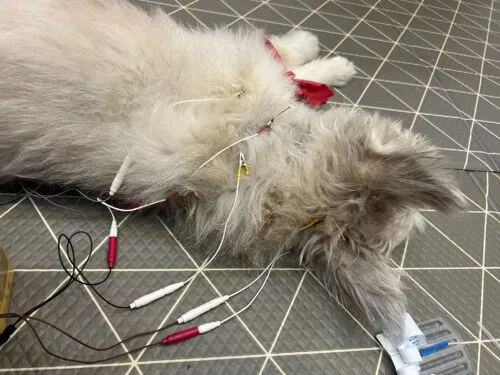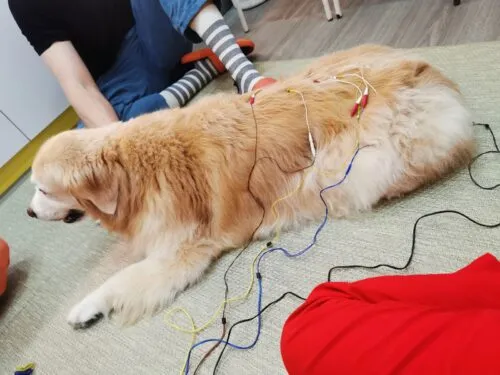REhabvet PET ACUPUNCTURE
Pet Acupuncture Singapore
EXCELLENTTrustindex verifies that the original source of the review is Google. Highly recommended by Charlie!Posted onTrustindex verifies that the original source of the review is Google. The place is clean and the team is friendly and professional. They are knowledgeable and work with confidence. They shared with me his problems and taught me how to massage him at home. My old boy is slowly gaining muscle strength. Way to go! 👍🏻👏🏻💪Posted onTrustindex verifies that the original source of the review is Google. We've sent both our dogs to RehabVet for some years now. Thanks to the staff at RehabVet, Butter loves his swim here. Both Butter and Maple loves the staff here when they come by for rehab exercises, swim/hydro.Posted onTrustindex verifies that the original source of the review is Google. Been with rehabvet for about 4 months . My dog is improving and enjoying the session . The staffs are friendly and helpfulPosted onTrustindex verifies that the original source of the review is Google. Haru has been going to rehabvet since Nov 2025 to manage his mobility caused by luxating patellar and hip dysplasia. Thus far, we witnessed huge improvements thru several methods of rehabilitation such as ultrasound/laser therapy, land exercises and hydrotherapy! Aside from the treatments, what made us continue with them is the hospitality of the staff! They are always so welcoming and you could feel the warmth everytime you step into the clinic! Plus point it’s a newly renovated clinic, shout out to the pool’s ramp, which Haru who dislikes swimming, swam a good 30 mins with Sean! We are amazed! Also, they treat your furkid with love and respect. Highly recommended. We are glad to have chosen rehabvet for HaruPosted onTrustindex verifies that the original source of the review is Google. Always a pleasant experience here at RehabVet- clean area, calm ambience and super patient therapists. Staff are very willing to share tips on home care massages and explain in detail how our pups muscles work, gait observation and strength training for them!Posted onTrustindex verifies that the original source of the review is Google. Met RehabVet at Pet Expo years ago and have trusted them with my dog ever since. Dr. Sara and the team’s explanations on joint care were very helpful and when my dog was injured recently, the treatment and home care really helped his recovery. Kind team and a lovely newly renovated space!Posted onTrustindex verifies that the original source of the review is Google. Friendly team and most importantly they helped my furkid with his muscle spasms and lower back painPosted onTrustindex verifies that the original source of the review is Google. My elderly dog had luxating patella. She showed good improvement after 10 sessions of infrared, ultrasound and massage. She stopped limping after the 1st few sessions and thereafter was able to walk well. I will continue with Rehab Vet for further treatment like hydro therapy. Staff are pleasant and professional.Posted onTrustindex verifies that the original source of the review is Google. Had a very positive experience at the rehab vet. The entire team was professional, gentle, and reassuring throughout the session. Dr Sara was especially wonderful — knowledgeable, patient, and took the time to explain everything clearly without rushing. You can tell she genuinely cares about the animals and their recovery. The facility has also just been renovated and is very clean, modern, and calm, making it a comfortable and conducive environment for both pets and owners. Truly appreciate the care and attention given. Highly recommended.Verified by TrustindexTrustindex verified badge is the Universal Symbol of Trust. Only the greatest companies can get the verified badge who has a review score above 4.5, based on customer reviews over the past 12 months. Read more
Acupuncture is a soothing yet highly effective treatment for both dogs and cats. It can assist with long-term conditions, support recovery after injuries, and help maintain your pet’s overall well-being.
At RehabVet, every acupuncture session is tailored to fit your pet’s individual needs. We provide one-on-one sessions in a calm environment, ensuring your dog or cat feels at ease. Our veterinarians are specially trained in veterinary acupuncture, so you can rest assured your pet is in experienced, caring hands.
How Does Acupuncture Work?
Endorphin Release: Acupuncture triggers the release of natural pain-relieving chemicals, promoting relaxation and reducing discomfort.
Enhanced Circulation: Placing needles on targeted points improves blood flow, helping speed up healing and lessen swelling.
Nerve Stimulation: Acupuncture can reduce pain signals and restore mobility by encouraging healthy nerve activity.
Immune Support: It also helps fortify your pet’s immune system, boosting their resilience and overall health.
Conditions That Benefit from Acupuncture
- Chronic Issues
Eases arthritis, hip dysplasia, and other ongoing joint or muscle problems. - Post-Injury Recovery
Aids in pain management and supports faster healing after trauma or surgery. - Digestive Concerns
Helps alleviate stomach and bowel discomfort and improve digestion. - Anxiety & Stress
Promotes calmness and can help pets cope with stress-related behaviors.
Benefits of Acupuncture
Natural Pain Relief
Acupuncture stimulates the release of endorphins—your pet’s natural painkillers—helping relieve discomfort without relying on heavy medication.Enhanced Blood Circulation
Gentle needle placement boosts blood flow, ensuring muscles and tissues receive the oxygen and nutrients they need to heal and stay healthy.Reduced Inflammation
By triggering the body’s natural healing response, acupuncture can help lower swelling and ease stiffness in joints and muscles.Improved Mobility
Pets suffering from arthritis or hip dysplasia often experience greater flexibility and movement after regular acupuncture sessions.Stress and Anxiety Relief
Acupuncture encourages relaxation, making it a helpful tool for pets dealing with anxiety or stress-related behaviors.Immune System Support
Targeted needle placement can help regulate the immune system, enhancing your pet’s overall resilience to illness.Faster Recovery from Injuries
When combined with conventional vet care, acupuncture can speed up healing by easing pain and promoting healthy circulation.Better Digestive Health
Acupuncture can help relieve gastrointestinal issues by supporting normal digestive function and reducing inflammation.Complements Other Treatments
Safe and versatile, acupuncture works well alongside medications, physical therapy, and other veterinary treatments, often enhancing their effectiveness.Safe and Low-Risk
With minimal side effects and discomfort, acupuncture offers a gentle solution that can fit seamlessly into your pet’s wellness routine.
Types of Conditions
Arthritis and Joint Pain
Acupuncture helps reduce inflammation, ease stiffness, and improve mobility in pets suffering from chronic joint issues.Hip Dysplasia
By relieving pain and promoting better blood flow, acupuncture can support the long-term management of hip dysplasia.Post-Surgery Recovery
Strategic needle placement can assist in reducing discomfort and accelerating healing after surgical procedures.Spinal and Neurological Disorders
For conditions like intervertebral disc disease, acupuncture may help decrease pain signals and support nerve function.Trauma and Injuries
Pets recovering from injuries, fractures, or muscle strains can benefit from the pain relief and faster healing acupuncture offers.Digestive Issues
Acupuncture can help soothe gastrointestinal problems such as nausea, vomiting, or diarrhea by encouraging normal digestive function.Respiratory Disorders
Certain respiratory conditions, like feline asthma or kennel cough, may improve with acupuncture’s circulation-enhancing effects.Skin Conditions
By aiding immune function and reducing inflammation, acupuncture can support the treatment of allergies, hot spots, and other skin irritations.Anxiety and Behavioral Concerns
Acupuncture has a calming influence that can assist pets experiencing stress, phobias, or other anxiety-driven behaviors.Geriatric Support
Senior pets often contend with multiple age-related conditions. Acupuncture can help enhance their comfort, mobility, and overall quality of life.
How are Acupuncture Sessions Conducted?
Initial Assessment
Our veterinarian begins by reviewing your pet’s medical history and current health concerns. This helps us determine the most effective acupuncture points and any additional treatments—like electrical therapy—that may benefit your pet.Gentle Needle Placement
We use ultra-fine, sterile needles that are gently inserted at specific points on your pet’s body. Most animals remain calm and comfortable during this process.Electrical Therapy (Electroacupuncture)
If recommended for your pet, we may apply a mild electrical current to the inserted needles. This enhanced form of acupuncture—known as electroacupuncture—can offer deeper and longer-lasting pain relief, improved circulation, and heightened nerve stimulation.Monitoring and Comfort
Throughout the session, we closely observe your pet’s reactions, adjusting as needed to keep them relaxed. We provide a peaceful environment with soft lighting and minimal noise to help your pet feel safe.Session Length
Each session generally lasts 20 to 30 minutes, depending on your pet’s condition and tolerance. Electroacupuncture sessions may vary slightly in duration based on how your pet responds.Post-Treatment Care
Afterward, we document your pet’s response and suggest next steps. Some pets experience immediate relief, while others may need multiple sessions for optimal results.
At RehabVet, our top priority is your pet’s well-being. We strive to make every session as relaxing and beneficial as possible, whether we use traditional acupuncture or electroacupuncture to support your pet’s health.

Is acupuncture painful for pets?
Acupuncture is generally not painful for pets. The needles used for acupuncture are much smaller than the ones used for injections, and they are inserted into specific points on the body that have a lower density of nerve endings. This means that most pets barely notice the needles going in. In fact, many pets find acupuncture to be quite relaxing, and some even fall asleep during the treatment.
That being said, it is important to note that every pet is different, and some may be more sensitive than others. In rare cases, a pet may experience some discomfort during acupuncture treatment, especially if they are already in pain or have sensitive skin. However, any discomfort is usually mild and short-lived.
It is also worth noting that a skilled and experienced acupuncturist will take great care to ensure that your pet is comfortable throughout the treatment. They will use the minimum number of needles necessary and adjust the depth and placement of the needles as needed to minimize any discomfort.

Frequently Asked Questions on Acupuncture for Pet
Does acupuncture actually work for dogs?
How long does it take for acupuncture to work for dogs?
What is the success rate of acupuncture for dogs?
Does acupuncture work for cats?
Yes, acupuncture can be beneficial for cats. Just like dogs, cats can benefit from this form of treatment for a range of conditions, including arthritis, neurological disorders, and gastrointestinal problems. Always consult with a trained veterinary professional to understand if it’s suitable for your cat.
What are the negative side effects of acupuncture?
What to expect after acupuncture for cats?
What are the benefits of acupuncture for cats?
How long does acupuncture take to work on cats?
What are the benefits of acupuncture in pets?
Yes, animals often feel relaxed and sleepy after an acupuncture session. This is a sign that the treatment is working and that the body is healing.
Should a dog rest after acupuncture?
Why is acupuncture so healing?
How do I know if acupuncture is working?
How long do the benefits of acupuncture last?
The benefits of acupuncture can vary. Some pets may experience immediate relief, which lasts for a few days, while others may need several sessions before noticeable changes occur. For chronic conditions, regular treatments may be needed to maintain benefits.
Most patients participating in aquatic therapy are already out of shape and swimming in a pool or lake requires more cardiovascular strength and endurance than is available.
Swimming in a hydrotherapy pool may be effective for some conditions, but again several factors are unable to be controlled during a free swim.
What not to do after acupuncture?
Is acupuncture once a month enough?
Is acupuncture 3 times a week too much?
Acupuncture should be stopped or reduced in frequency when the desired improvement in the pet’s condition has been achieved and maintained. Regular check-ups with your veterinary acupuncturist can help decide when to adjust treatment frequency or stop altogether.
